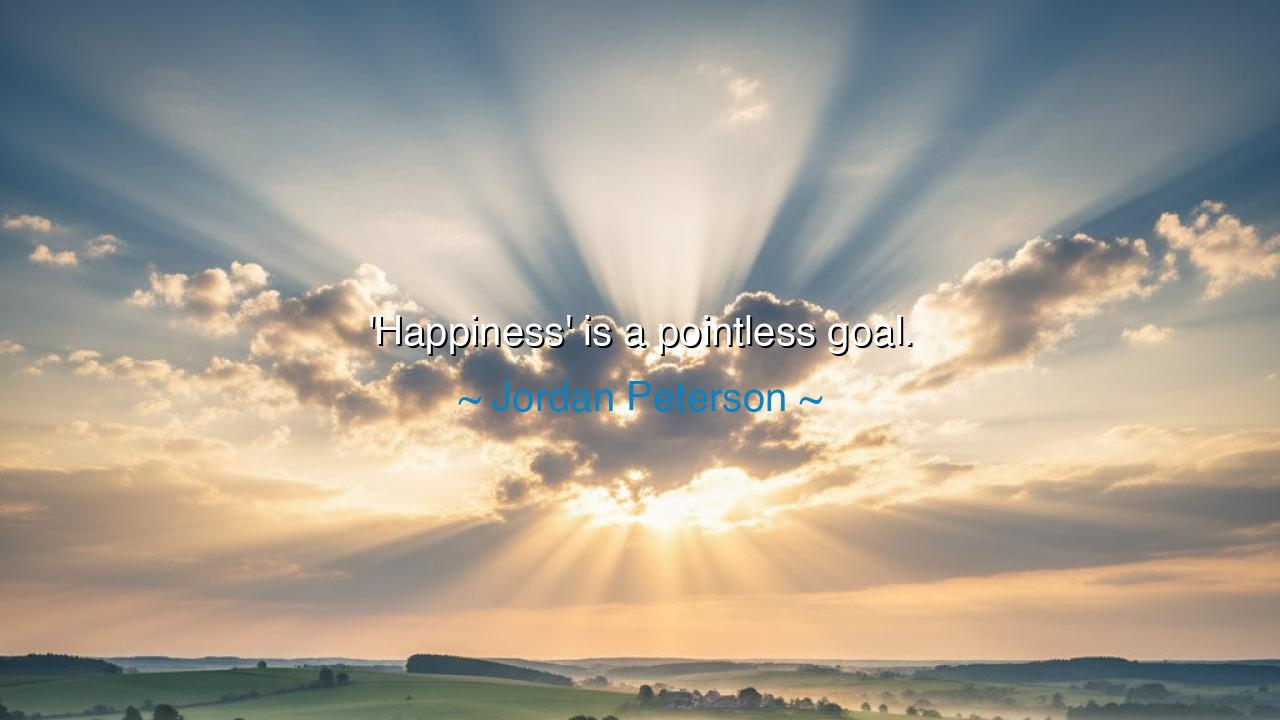
'Happiness' is a pointless goal.






“‘Happiness’ is a pointless goal.” – Jordan Peterson
In this striking and paradoxical declaration, Jordan Peterson, the modern philosopher and psychologist, unmasks one of the most dangerous illusions of our age — the pursuit of happiness as an end in itself. His words pierce through the veil of comfort-seeking that has ensnared much of the modern soul. He tells us that happiness, that fleeting feeling of ease and pleasure, is not a worthy goal for a human life. For happiness, like sunlight, cannot be grasped; it flickers, it fades, it dances only upon the surface. To build one’s life upon it is to build upon the wind. Instead, Peterson calls us to a higher pursuit — one of meaning, responsibility, and purpose. For these, unlike happiness, endure when storms come and sorrow falls.
The origin of this truth lies in Peterson’s study of human suffering and psychology. He has seen that those who make happiness their god often find themselves restless and hollow, for happiness cannot be pursued directly. It is a byproduct, not a destination. To live chasing pleasure is to live as a leaf upon the current, tossed by every change of circumstance. But to live for meaning — to take up a burden that gives life weight and direction — is to stand like a tree whose roots drink from the depths of being itself. Happiness may come and go like the breeze, but meaning remains through every season.
The ancients knew this long before our modern age of comfort and indulgence. The Stoic philosophers taught that man should not seek to feel good, but to be good. Epictetus, born a slave and crippled in body, found serenity not by seeking pleasure, but by mastering his own soul. He taught that virtue — not happiness — is the true good, and that when one lives rightly, happiness will visit of its own accord, as a guest, not a master. The wise man, he said, does not chase joy, but fulfills his duty with dignity, and joy arises naturally from the harmony between his deeds and his soul.
To understand Peterson’s words, consider the story of Viktor Frankl, the psychiatrist and Holocaust survivor who endured years in the Nazi concentration camps. He watched as men were stripped of everything — health, freedom, family, hope. Those who lived only for happiness perished quickly, for there was none to be found. But those who lived for meaning, who found purpose even in their suffering — in comforting others, in retaining their dignity, in bearing witness to truth — they endured. Frankl later wrote, “Those who have a why to live can bear almost any how.” This is the very essence of Peterson’s teaching: meaning gives life strength; happiness gives it only comfort.
Happiness, when made into a god, becomes a cruel one. It demands constant sacrifice — more pleasure, more distraction, more ease — yet gives nothing lasting in return. Those who worship it find themselves enslaved to its absence. But when one devotes himself to a noble cause, when he shoulders responsibility willingly, even suffering becomes sacred. There is a deeper joy — not of the senses, but of the spirit — that arises when a man knows he is walking the right path, even when that path is steep. This is not happiness, but fulfillment — a peace that survives the storms of life because it is rooted in truth, not emotion.
Peterson’s teaching is thus not a rejection of happiness, but a reordering of the soul. He does not say, “Do not be happy,” but rather, “Do not make happiness your master.” Live for what is right, not for what is pleasant. Build your life around responsibility, for in carrying what is heavy, you discover your strength. Happiness will come to you then, as the shadow follows the sun — quietly, naturally, without effort. The man who pursues meaning will find both joy and sorrow, but he will find himself. The man who chases happiness will find only emptiness, for he has fled from the very weight that makes life real.
So, my children, take this teaching to heart: do not live to be happy; live to be worthy. Seek not the easy road, but the right one. When pain visits, do not flee; ask what lesson it brings. When the world feels heavy, lift your portion with courage, and know that in doing so you are shaping your soul. For happiness that is sought will always elude you, but happiness that grows from purpose will never leave you.
And when your days grow dark, and laughter feels far away, remember this truth: happiness is a guest that comes and goes, but meaning is the home that remains. Build your life upon that foundation, and you will never be poor, no matter how sorrowful the hour — for your heart will dwell not in the pursuit of pleasure, but in the eternal flame of purpose.






AAdministratorAdministrator
Welcome, honored guests. Please leave a comment, we will respond soon